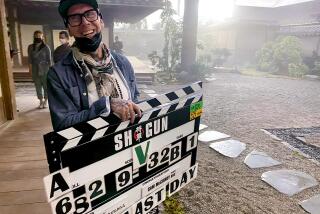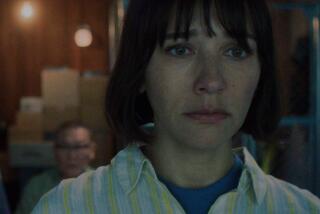Movie Reviews : Plot Twists Cast Shadows Over ‘Rising Sun’ : Thriller Is Alternately Too Easy and$Too Difficult to Follow
- Share via
“Rising Sun” has gotten everything backward. Mystifying when it should be clear and clear when it should be mystifying, it is the murkiest, most unsatisfying of thrillers. And the biggest mystery of all is how a project that appeared to have so much going for it could have gone so determinedly astray.
For the Michael Crichton novel “Rising Sun” (citywide) is based on was more than a top bestseller. Its story of how the investigation of an L.A. murder exposes a secret Japanese determination to infiltrate and subvert the most potent of American institutions, including this very newspaper, became controversial in ways few novels do, as outraged editorials and op-ed pieces soon bloomed like a thousand flowers.
And when 20th Century Fox purchased the book, it decided to take it the quality route, signing Philip Kaufman (“Henry & June,” “The Unbearable Lightness of Being”) to direct and pairing Sean Connery and Wesley Snipes as the local cops who solve the mystery. And, in fact, the actors give capable performances and Kaufman’s direction shows signs of his usual intelligence. So why does the end result feel as dispiriting and out of whack as “Rising Sun” finally does?
The answer is right there in that book, a novel whose suitability as source material for a blockbuster turns out to be more problematic than anticipated. For “Rising Sun,” as anyone who noticed its three-page bibliography should have grasped, is no thriller but a thinly disguised political tract. And even though all those pages and pages of densely packed information about Japanese society and business practices might look awfully silly on screen, to eliminate them (as Kaufman largely did, apparently to the displeasure of his co-screenwriters Crichton & Michael Backes) is to leave the movie’s plot naked and exposed as the puny thing that it is.
“Rising Sun” (rated R for strong sexuality, language and some violence) starts out telling two stories at once, one corporate, the other personal. The former details how Nakamoto, the fierce Japanese conglomerate, aided by smooth American lawyer Bob Richmond (Kevin Anderson) is trying to buy a computer chip company called MicroCon despite the opposition of Sen. John Morton (Ray Wise), who thinks it would be bad for national security to let control of such sophisticated information out of the country.
The personal story illustrates the rather volatile relationship between a bored blond concubine named Cheryl Lynn Austin (model Tatjana Patitz) and well-connected Japanese party animal Eddie Sakamura (Cary-Hiroyuki Tagawa). An excitable type given to snarling “Don’t ever try that again--or else!” at slight provocation, Eddie takes Cheryl Lynn to a celebration at the new Nakamoto Tower in downtown L.A., where she is soon found dead on the very table those super-secret MicroCon talks have been held around.
Called in to investigate are Web Smith (Snipes), a lieutenant in the Special Services section of the Los Angeles Police Department, and John Connor (Connery), an old Japan hand who speaks the language and knows so much about the culture it’s almost frightening. Though edgy with each other at first, the two men soon concentrate on the crime at hand and what connection, if any, it has to what else has been happening on that Nakamoto table.
To anyone with even a casual familiarity with movie conventions, the various plot twists of “Rising Sun,” the gradual discovery of who did what to whom, will be awkwardly obvious well in advance of their discovery by Smith and Connor. This plot predictability, which the book’s extensive political fulmination managed to camouflage, is one of the stones that sink the film.
Not being fools, the makers of “Rising Sun” were aware of this problem, but unfortunately the tactic they chose to combat it only adds to the overall difficulty. Faced with a self-evident story line, the movie has decided to make everything peripheral it could lay hands on as confusing as possible, the better to divert attention from that core obviousness.
So while the novel takes the necessary time to explain what Special Services does, the film doesn’t. While the novel describes Connor as a legend and leaves it at that, the movie adds the mock-ominous notation, typically not followed up on, that “some said he was a man who couldn’t be trusted.” Again and again, scenes are either shot or presented in a way intended to maximize audience perplexity. The result, as noted, is a film that is alternately too easy and too difficult to follow.
Adding further to “Rising Sun’s” problems is that director Kaufman does not seem comfortable with the project’s potboiler qualities, leading to awkward scenes of sexual abandon and unbelievable ones of street gang cooperation with Smith and Connor. Similar difficulties touch the film’s uncertain treatment of the racist, xenophobic cop Tom Graham (Harvey Keitel), who refers to the murder victim as “a blond piece of sushi” and views the Japanese as little more than “known world-class perversion freaks.”
Kaufman’s version of “Rising Sun” has made the villainy less racially one-sided and toned down the book’s relentless insistence that the Japanese are intent on swallowing America whole. Perhaps he thought he could make Crichton’s polemic into an elegant meditation on Japanese thought and action, complete with Connery’s John Connor passing on his knowledge to Web Smith by saying wise things like “Their way is better. They fix the problem, not the blame.”
But making the Japanese less conniving--correct and responsible a decision though that was--inevitably helps to leave this particular movie bereft of any convincing reason for being. And the notion that every bestseller does not cry out to be filmed continues to be one lesson Hollywood shows no inclination to learn.
‘Rising Sun’
Sean Connery: John Connor
Wesley Snipes: Web Smith
Harvey Keitel: Tom Graham
Cary-Hiroyuki Tagawa: Eddie Sakamura
Kevin Anderson: Bob Richmond
Mako: Yoshida-san
Ray Wise: Sen. John Morton
Tia Carrere: Jingo Asakuma
A Walrus & Associates Ltd. production, released by 20th Century Fox. Director Philip Kaufman. Producer Peter Kaufman. Executive producer Sean Connery. Screenplay Philip Kaufman and Michael Crichton & Michael Backes, based on the novel by Michael Crichton. Cinematographer Michael Chapman. Editors Stephen A. Rotter and William Scharf. Costumes Jacqueline West. Music Toru Takemitsu. Production design Dean Tavoularis. Art director Angelo Graham. Set decorators Gary Fettis. Running time: 2 hours, 9 minutes.
MPAA-rated R (strong sexuality, language and some violence).
More to Read
Only good movies
Get the Indie Focus newsletter, Mark Olsen's weekly guide to the world of cinema.
You may occasionally receive promotional content from the Los Angeles Times.











